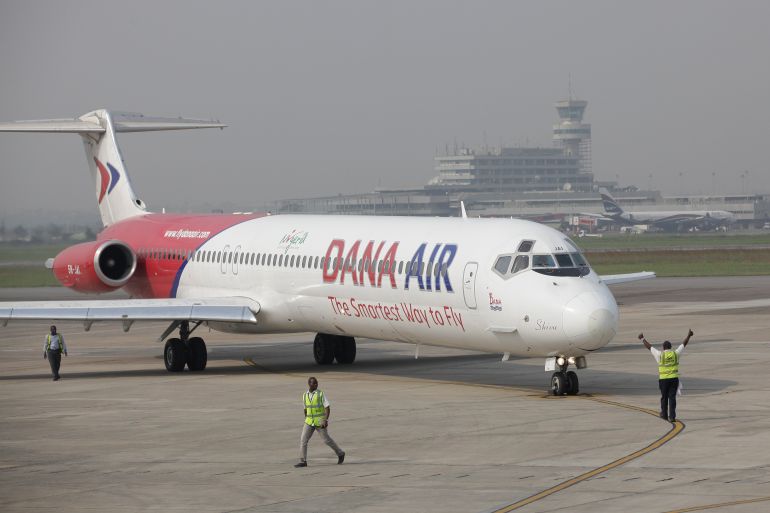Nigeria’s NNPC, central bank ‘cannot help fix’ jet fuel prices
The jet fuel price increase has affected already debt-laden airlines that rely on the import.

The head of Nigeria’s state oil firm and the central bank governor have told the national assembly and the country’s airlines they are unable to help with soaring jet fuel prices.
However, in a resolution to the meeting, the Nigerian National Petroleum Corporation (NNPC) agreed to supply jet fuel to marketers nominated by the Airline Operators of Nigeria (AON).
Keep reading
list of 4 itemsNigerian electoral commission chair denies interest in presidency
‘Bandits’ kill 48 in northwest Nigeria attacks: Local officials
Nigerian airlines suspend flights over soaring jet fuel prices
The association will apply for a jet fuel import licence, the speaker of the house of representatives Femi Gbajabiamila, said.
“We cannot fix the prices … on a deregulated commodity. The only way we can fix the price of aviation fuel is to introduce a subsidy,” NNPC chief Mele Kyari told MPs.
Central bank governor Godwin Emefiele, who is making an unprecedented presidential run, said he could not offer the airlines a “concessionary rate” on foreign exchange to help with imports.
“If it is naira intervention that airlines want, they could approach their banks,” Emefiele told the lawmakers. “The banks would look at it.”
Dependency and ‘failed promises’
Nigeria’s oil refineries, relics of colonial times that have been mismanaged for years, are barely functional. As a result, Africa’s largest oil producer has to rely mostly on imports of refined fuel for its domestic needs.
But fuel prices have risen sharply around the world since Western companies began imposing a series of increasingly tight financial sanctions on Russia after its invasion of Ukraine in late February.
The price increase has affected already debt-laden airlines that rely on imported kerosene or jet fuel, which is not subsidised, unlike gasoline.
The head of AON says this situation did not have to be this dire and that NNPC had failed to deliver on a promise to supply jet fuel at a fixed 500 naira ($1.21) a litre.
“NNPC told us the president has approved 25,000 metric tonnes for us (airlines) but we never got this fuel,” Allen Onyeama, vice president of AON and chairman of Air Peace, said, referring to Nigerian President Muhammadu Buhari.
“We nominated some marketers who have been licensed … to handle the 25,000 tonnes, but we are yet to get this fuel.”
The AON nearly suspended flights but U-turned on the decision just hours before the move was due to take effect on Sunday.